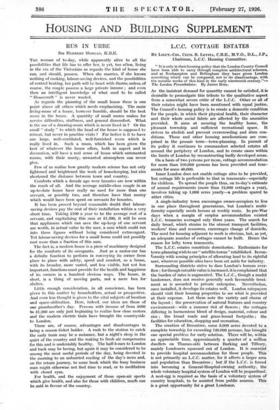L.C.C. COTTAGE ESTATES
BY LIEUT.-COL. CECIL B. LEvrrA, C.B.E., M.V.O., D.L., J.P. Chairman, L.C.C. Housing Committee.
" It is only in their housing policy that the London County Council have been able to carry through complete architectural schemes, and at Roehampton and Bellingham they have given London something which can be compared, not to its disadvantage, with the notable works of this kind in the early nineteenth century."--•
The London Perambulator. By James Bone.
As the insistent demand for quantity cannot be satisfied, it is desirable to promulgate this tribute to the qualitative aspect from a somewhat severe critic of the L.C.C. Other or all of their estates might have been mentioned with equal justice. The Council's housing policy is to create a domestic condition for the people, in which their physical health, their character and their whole social fabric are affected by the amenities provided. It aims at securing the healthy home, the pleasant township and sufficient recreational space. It strives to abolish and prevent overcrowding and slum con- ditions. These and other housing ameliorations are com- prised in the prosaic term—town-planning. In pursuit of its policy it continues to commandeer selected estates all around the periphery of London, and to create oases within the limits of London by reconstructing badly developed areas. On a basis of two persons per room, cottage accommodation for more than 100,000 persons has been provided and tene- ments for some 40,000. - Inner London does not enable cottage sites to be provided, but cottage life, is preferable to that in tenements—especially
for children. To spread the people thus, on to-day's estimate of annual requirements (more than 12,000 cottages a year), involves taking up 1,000 acres yearly—a problem spared to
other cities. - _
A single-industry town encourages owner-occupiers to live in one place throughout generations, but London's multi- formit-y especially needs houses at weekly rents. to pre-War
days when a margin of surplus accommodation existed L.C.C. tenancies averaged only. three years. The search for
daily bread, which strains to the utmost transport. facilities, workers' time and resources, encourages change of domicile. The need for housing adjacent to work is obvious, but, as yet, an adequate number of cottages cannot be built. HenCe the reason for lofty town tenements.
The L.C.C. estates constitute dormitories; Enthusiasts for town-planning wish to see" satellite towns" established. In con- formity with zoning principles of allocating land to its, rightful user, wherever possible sites have been set aside for industry.
Surrounding districts strive to dam London's human over- .
flow ; for though rateable value is increased, it is complained that the burden of rates is augmented. The L.C.C., though a model landowner, does not receive generally such favourable 'treat-
ment as is accorded to private enterprise. Nevertheless, once installed, it develops its estates well. London ratepayers
should visit their housing properties to see what is provided at their expense. Let them, note the variety and charm of the layout ; the preservation of natural features and country environment—with a summer riot. of flowers; the cottages differing in harmonious blend of design, material, , colour and size ; the broad roads and grass-bound footpaths ; the facilities for education, shopping and recreation...
The creation of Becontree, some 3,000 acres devoted to a complete township for exceeding 120,000 persons, has brOught - one special problem for early solution. There will be, within an appreciable time, approximately a quarter of a million dwellers on Thames-side between Barking and TilburY, mainly Londoners squeezed out of London. It is essential to provide hospital accommodation for these people. This is not primarily an L.C.C. matter, for it affects a larger area and population than Becontree ; but _if. the L.C.C. is forced ". into becoming a General-Hospital-owning authority, the whole voluntary hospital system of London will be jeopardized: A nest-egg is required, as the basis of a voluntary System of country hospitals, to be assisted from public sources. This, is a great opportunity for a great Londoner.






















































 Previous page
Previous page